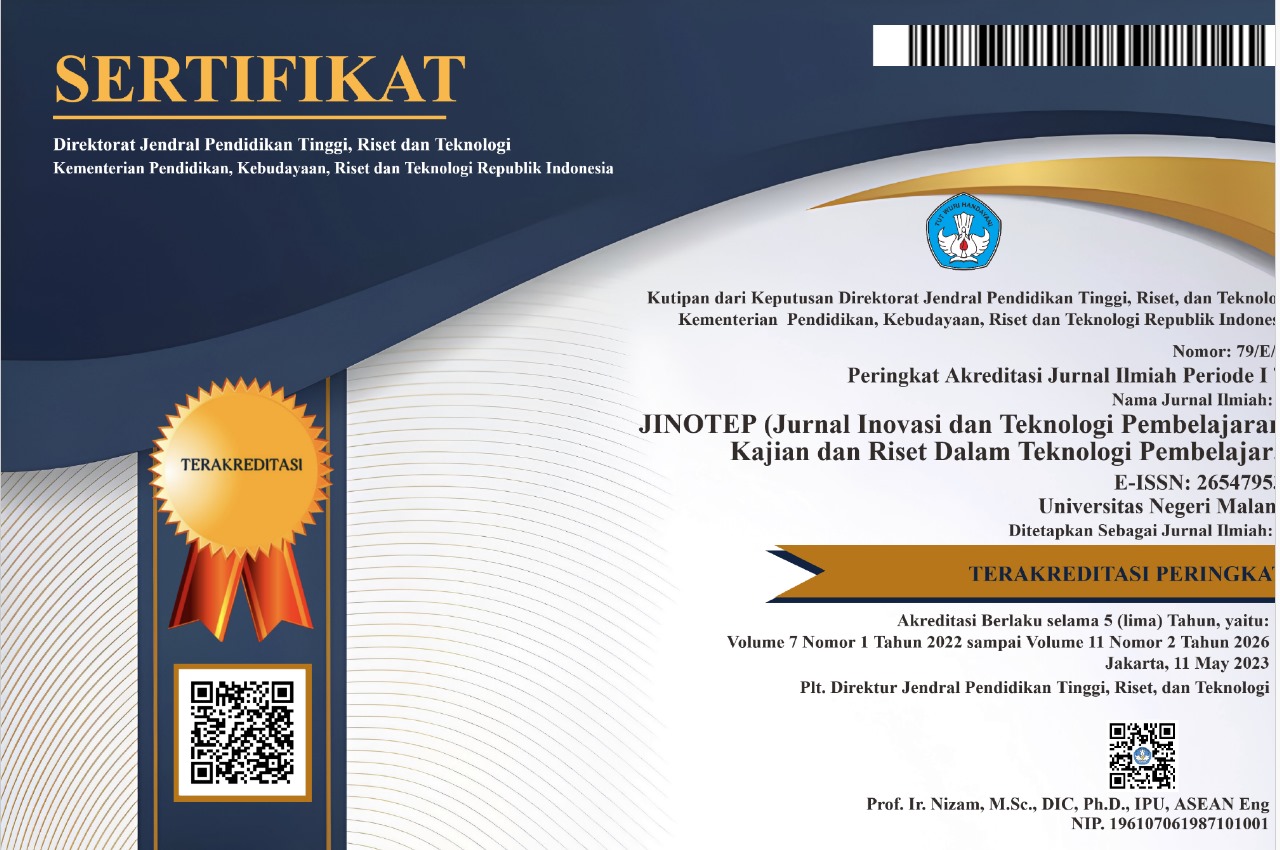Students’ collaboration and communication skills with problem-based learning model
Abstract
Abstrak: Penelitian ini bertujuan untuk mengetahui tingkat keterampilan kolaborasi dan komunikasi peserta didik dengan model Problem Based Learning (PBL). Subjek penelitian ini adalah 77 peserta didik yang dipilih dengan teknik purposive sampling. Penelitian ini menggunakan jenis penelitian deskriptif kuantitatif. Pengukuran data menggunakan lembar observasi yang dianalisis dengan persentase. Berdasarkan hasil penelitian keterampilan kolaborasi dan komunikasi dengan model Problem Based Learning (PBL) menunjukkan bahwa secara keseluruhan peserta didik kelas XI IPS SMAN di Banyuwangi sudah mencerminkan keterampilan kolaborasi dan komunikasi. Persentase keterampilan kolaborasi peserta didik kelas XI IPS SMAN di Banyuwangi sebesar 60,5 persen yang termasuk dalam kategori “cukup”. Selanjutnya persentase keterampilan komunikasi peserta didik kelas XI IPS SMAN di Banyuwangi sebesar 53,2 persen yang termasuk dalam kategori “cukup”. Hasil dari keterampilan kolaborasi dan komunikasi peserta didik ini menyatakan bahwa setiap peserta didik telah menunjukkan sikap dari keterampilan-keterampilan tersebut.
Abstract: This study aims to determine the level of collaboration and communication skills of students with problem-based learning models. The sample of this research was 77 students which were selected by purposive sampling technique. This research uses a type of quantitative descriptive research. Measurement of data using observation sheets were analyzed by calculating the average value of the percentage. Based on the results of research on collaboration and communication skills with the Problem Based Learning (PBL) learning model, it shows that overall the students of class XI Social Sciences at Senior High School in Banyuwangi already reflect collaboration and communication skills. The percentage of collaboration skills of class XI Social students at Senior High School in Banyuwangi is 60.5 percent, which is in the "enough" category. Furthermore, the percentage of communication skills of class XI Social students at Senior High School in Banyuwangi is 53.2 percent, which is in the "enough" category. The results of these students' collaboration and communication skills state that each student has shown an attitude of these skills.
Keywords
Full Text:
PDFReferences
Amran, A., Perkasa, M., Satriawan, M., Jasin, I., & Irwansyah, M. (2019). Assessing students 21st century attitude and environmental awareness: promoting education for sustainable development through science education. Journal of Physics: Conference Series, 1157(2). https://doi.org/10.1088/1742-6596/1157/2/022025
Arikunto, S. (2019). Prosedur penelitian: suatu pendekatan praktik. Jakarta: Rineka Cipta.
Awang, H., & Daud, Z. (2015). Improving a communication skill through the learning approach towards the environment of engineering classroom. Procedia - Social and Behavioral Sciences, 195, 480–486. https://doi.org/10.1016/j.sbspro.2015.06.241
Fauzan, M., Gani, A., & Syukri, M. (2017). Penerapan model problem based learning pada pembelajaran materi sistem tata surya untuk meningkatkan hasil belajar siswa. Jurnal Pendidikan Sains Indonesia, 5(1), 27-35. https://jurnal.usk.ac.id/JPSI/article/view/8404
Hayat, M. S., Rustaman, N. Y., Rahmat, A., & Redjeki, S. (2019). Perkembangan keterampilan komunikasi dan kolaborasi mahasiswa dalam perkuliahan keanekaragaman tumbuhan melalui inkuiri berorientasi enterpreneurship. Jurnal Mangifera Edu, 4(1), 21. https://doi.org/10.31943/mangiferaedu.v4i1.41
Hayati, A. F., Murdy, K. (2016). Pengaruh metode pembelajaran berbasis masalah (problem based learning) terhadap peningkatan kemampuan berpikir kreatif siswa pada mata pelajaran ekonomi. Oikos : Jurnal Kajian Pendidikan Ekonomi dan Ilmu Ekonomi, 1(1), 61-71. https://doi.org/10.23969/oikos.v1i1.235
Jalmo, T., D. Fitriyani, & B. Yolida. (2019). Penggunaan problem based learning untuk meningkatkan keterampilan kolaborasi dan berpikir tingkat tinggi. Jurnal Bioterdidik, 7(3), 77-87. http://jurnal.fkip.unila.ac.id/index.php/JBT/article/view/17480
Junita, A., B. Suprianto, & W. (2021). Purwianingsih. Profil keterampilan kolaborasi siswa sma pada praktikum maya sistem ekskresi. Assimilation: Indonesian Journal of Biology Education, 4(2), 50-57. https://doi.org/10.17509/aijbe.v4i2.41480
Kamaruzzaman. (2016). Analisis keterampilan komunikasi interpersonal siswa. Jurnal Konseling. 2(2), 202-210. https://doi.org/10.24176/jkg.v2i2.744
Kilbane, C. R dan Milman, N. B. (2014). Teaching model, designing instruction for 21st century learners. New York: Pearson.
Kids, B. for. (2019). Framework for 21st century learning definitions. Partnership for 21st Century Learning.
Kurniawan, H. (2020). Pembelajaran era 4.0; integritas penguatan pendidikan karakter, keterampilan abad 21, hots, dan literasi dalam perspektif merdeka belajar. Yogyakarta: Media Akademi.
Kovalyova, Y. Y., Soboleva, A. V., & Kerimkulov, A. (2016). Project based learning in teaching communication skills in english as a foreign language to engineering students. International Journal of Emerging Technologies in Learning (iJET), 11(04), 153–156. https://doi.org/10.3991/ijet.v11i04.5416
Listiani, N. M. (2017). Pengaruh kreativitas dan motivasi terhadap hasil belajar mata pelajaran produktif pemasaran pada siswa kelas xi smk negeri 2 tuban. Jurnal Ekonomi Pendidikan Dan Kewirausahaan, 2(2), 263. https://doi.org/10.26740/jepk.v2n2.p263-275
Marlina, E. (2020). Pengembangan model pembelajaran blended learning berbantuan aplikasi sevima edlink. Jurnal Padegogik, 3(2), 104–110. https://doi.org/10.35974/jpd.v3i2.2339
Nasihah, E. D., Supeno, S., & Lesmono, A. D. (2019). Model problem based learning (pbl) disertai tutor sebaya untuk meningkatkan keterampilan berpikir kritis siswa sma. FKIP E-Proceeding, 3(2), 178–183. https://jurnal.unej.ac.id/index.php/fkip-epro/article/view/9419
Nismawati., C. Nugroho., S. Selfiardy. (2021). Teacher strategies based local wisdom in building character effort of high school students in tomohon. ICHELSS: International Conference on Humanities, Education, Law, and Social Sciences, 1(1), 559-563. https://journal.unj.ac.id/unj/index.php/hispisi/article/view/22218
Nopriska, N. I., A. S. Putri., T. R. Calista., & R. Hikmawan. (2021). Apakah model pembelajaran problem-based learning efektif diterapkan pada pendidikan kejuruan abad 21?. Jurnal INTEGRATED (Information Technology and Vocational Education), 3(1), 23-31. https://ejournal.upi.edu/index.php/integrated/article/view/32735
Purwati, S., & Darussyamsu, R. (2021). Model pembelajaran problem based learning untuk meningkatkan kemampuan komunikasi. Prosiding Seminar Nasional Biologi, 1(1), 917-922. https://doi.org/10.24036/prosemnasbio/vol1/115
Ramadina, A., & L. Rosdiana. (2021). Keterampilan komunikasi siswa setelah diterapkan strategi active knowledge sharing ketika pembelajaran daring. PENSA E-JURNAL : PENDIDIKAN SAINS, 248-251. https://ejournal.unesa.ac.id/index.php/pensa/article/view/38273
Sari, N.H., Sesunan, F., & Nyeneng, I.D.P. (2019). Pengaruh model pembelajaran think pair share terhadap hasil belajar fisika siswa ditinjau dari keterampilan berkomunikasi. Jurnal Pendidikan Fisika Universitas Muhammadiyah Metro, VII(1), 68-80. http://dx.doi.org/10.24127/jpf.v7i1.1396
Scager, K., Boonstra, J., Peeters, T., Vulperhorst, J., & Wiegant, F. (2016). Collaborative learning in higher education: evoking positive interdependence. CBE Life Sciences Education, 15(4), 1–9. https://doi.org/10.1187/cbe.16-07-0219
Sufajar, D., & A. Qosyim. (2022). Analisis keterampilan kolaborasi siswa smp pada pembelajaran ipa di masa pandemi covid-19. Pensa E-Jurnal : Pendidikan Sains, 10(2), 254-259. https://ejournal.unesa.ac.id/index.php/pensa/article/view/45054
Sugito, S., Susilowati, S. M. E., Hartono, H., & Supartono, S. (2017). Enhancing students’ communication skills through problem posing and presentation. International Journal of Evaluation and Research in Education, 6(1): 17-22. http://doi.org/10.11591/ijere.v6i1.6342
Susetyarini, E., E. Nurohman., & H. Husamah. (2022). Analysis of students collaborative, communication, critical thinking, and creative abilities thought problem based learning. Jurnal Penelitian dan Pengkajian Ilmu Pendidikan: e-saintika, 6(1), 33-42. https://doi.org/10.36312/esaintika.v6i1.584
Wati, M. Y., I. A. Maulidia., Irnawati, & Supeno. (2019). Keterampilan komunikasi siswa kelas vii smpn 2 jember dalam pembelajaran ipa dengan model problem based learning pada materi kalor dan perubahannya. Jurnal Pembelajaran Fisika, 8(4), 275 – 280. https://jurnal.unej.ac.id/index.php/JPF/article/view/15237
Wynn, C., Mosholder, R., & Larsen, C. (2014). Measuring the effects of problem-based learning on the development of postformal thinking skills and engagement of first-year learning community students. Learning Communities Research and Practice, 2(2), 4. http://washingtoncenter.evergreen.edu/lcrpjournal/vol2/iss2/4
Zubaidah, S. (2019). Keterampilan abad ke-21: bagaimana membelajarkan dan mengasesnya. Seminar Nasional, 1-25.
DOI: http://dx.doi.org/10.17977/um031v10i32023p225
Refbacks
- There are currently no refbacks.
Copyright (c) 2023 Cynthia Nora Dwi Putri, Retna Ngesti Sedyati, Mukhamad Zulianto

This work is licensed under a Creative Commons Attribution-ShareAlike 4.0 International License.
======================================================================
Jurnal Inovasi dan Teknologi Pembelajaran published by Universitas Negeri Malang in collaboration with the Asosiasi Program Studi Teknologi Pendidikan Indonesia (APS TPI) and Ikatan Profesi Teknologi Pendidikan Indonesia (IPTPI) with a MoU.
Publisher Address:
Educational Technology Laboratorium, Building D5, 1st Floor
Faculty of Education, Universitas Negeri Malang
Semarang St. No. 5, Malang City, East Java Province, Postal Code 65145
Email: jinotep.fip@um.ac.id
======================================================================

JINOTEP is licensed under a Creative Commons Attribution-ShareAlike 4.0 International License.
JINOTEP Statistics (Since July 13th, 2020)



.png)




.png)
1.png)
1.png)
4.png)
2.png)
1.png)
1.png)
.png)


_3.png)





1.png)
.png)